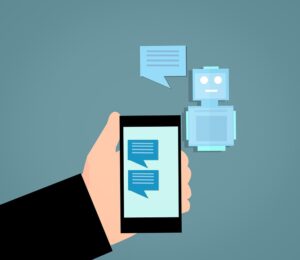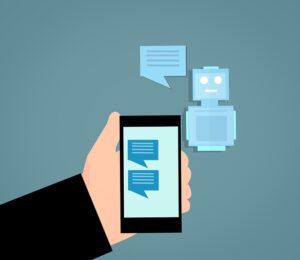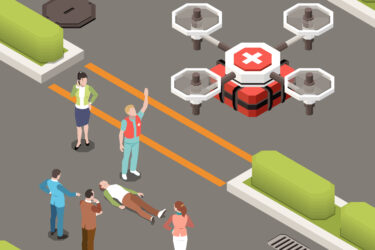
The artificial intelligence chatbot ChatGPT has made headlines across various industries including health care since its November release, garnering 100 million users in its first two months. Chatbots are computer programs designed to simulate conversation, and the technology behind the program, called Generative Pre-trained Transformer 3, learns from deep amounts of data to produce human-like text.
The program can help predict what comes next in a sequence and could be used for tasks as wide-ranging as writing resumes, explaining complex topics and creating content in multiple languages, according to news reports. Unlike other artificial intelligence programs, the program doesn’t just analyze data or organize content, it can create it, according to SFGATE. Users can type in a prompt on the platform and the chatbot will usually return a coherent answer. How? Because the program is trained on massive data sets of text to understand how people interact, including what to say and when.
One December study published in MedRxiv and PLOS Digital Health found that the chatbot could perform at or near the passing threshold for the U.S. Medical Licensing Exam without any specialized training or reinforcement. Another February study determined that the AI model could provide mostly appropriate responses to simple questions about cardiovascular disease prevention.
ChatGPT could potentially be used to assist with repetitive, time-consuming tasks such as data entry, appointment scheduling and language translation, according to an opinion piece in MedPage Today written by physician and health care consultant Harvey Castro. It also could help expand health care access in underserved communities through telemedicine and virtual medical assistants.
In a February Forbes article, Robert Pearl, M.D., wrote that generative AI “will alter medical practice in previously unimaginable ways.” Over time, tools like this — which become exponentially faster — could learn to emulate how doctors make clinical decisions, help provide 24/7 medical assistance by synching with wearable devices, and remind patients when they are due for preventive screenings or prescription medicine refills, according to Pearl. These tools could also learn evidence-based guidelines and warn clinicians when they are about to make a medical error, or learn to predict the next set of steps in caring for patients.
Cautions to consider
Some clinicians have expressed cautions about the technology. Questions remain about the chatbot’s ability to address empathy, ethics and critical thinking, wrote Megan FitzGerald, Dr.P.H., M.P.H., R.N., an adjunct professor with the Columbia University Mailman School of Public Health, in an opinion piece in MedPage Today.
“In health care, clinical judgment, ethics, and treating patients as individuals is a critical part of patient care,” FitzGerald wrote. “It’s also why so many tech companies have failed in healthcare, as they don’t account for the necessary human interaction, which limits the success of their products.”
Other potential pitfalls were noted in a recent blog post by executives of Orbita, a company that creates health care-focused AI tools. Patients may start using ChatGPT to try to self-diagnose like some do now through Google or other search engines, not fully understanding that the chatbot is not a clinical decision-making tool. There is no human oversight over generated responses, not all of which may be accurate or based on the most recent guidelines, and the tool is not compliant with federal privacy laws.
“Although ChatGPT can help physicians, they need to tread carefully and not use it as a primary source without verification,” wrote Rushabh Doshi and Simar Bajaj in an opinion piece in STAT.
Other generative AI tools
ChatGPT isn’t the only generative AI tool to attract news coverage. Google’s Bard and MedPaLM also have been generating headlines, with MedPaLM achieving 85% accuracy on a U.S. Medical Licensing Exam practice test.
OpenAI’s GPT-4, which was released in mid-March, has a program set for distribution later in the year called Dragon Ambient eXperience Express, which will create an automatic clinical note based on recordings of patient visits. The tool can combine ambient sound and conversations to capture and analyze patient encounters with providers and produce a draft of a standardized clinical note for a provider’s review, MedPage Today reported, which the company is touting as one way of helping reduce provider burnout. MaineHealth is one health system piloting the tool.
Resources for journalists
Journalists covering stories about the use of this technology in the health care arena might ask clinicians about how the chatbot is being incorporated into health care practice and how results generated by the tool are being vetted. How accurate are the responses they are receiving? What do the clinicians like or dislike about the program? What are its advantages and disadvantages? How easy is it to use? How will they handle patient privacy concerns in cases where conversations are being recorded? And importantly, what are the limitations and how are they compensating for those?
A recent story post about AI that I put together for AHCJ offers some ideas for possible article ideas. And for people new to the beat, I put together a tip sheet about AI, which is available on the AHCJ website to members.
ChatGPT resources
- What to know about OpenAI, the company behind ChatGPT — a primer article from the Washington Post that explains what the technology is and how it works
- If you still aren’t sure what ChatGPT is, this is your guide to the viral chatbot that everyone is talking about – an article from Business Insider
- AI, explained: The everyday person’s guide to ChatGPT — an article from SFGATE
- OpenAI and ChatGPT: A Primer for Healthcare Leaders — a blog post from Orbita
- 5 Ways ChatGPT Will Change Healthcare Forever, For Better – an article from Forbes
- ChatGPT is more like penicillin than precision medicine — an opinion piece in MedPage Today
- ChatGPT-assisted diagnosis: Is the future suddenly here? — an article from STAT
- As AI gains steam in medical note-taking, accuracy concerns mount — an article from STAT
- AI-Generated Medical Advice-GPT and Beyond | Law and Medicine — an article from JAMA








